Submitted:
27 May 2024
Posted:
28 May 2024
You are already at the latest version
Abstract
Keywords:
1. Introduction
2. Results
3. Discussion
4. Materials and Methods
4.1. Experimental Design and Fruit Harvest
4.2. Fruit Classification by Colour
4.3. Sample Preparation and Analysis
4.4. Data Analysis
Author Contributions
Funding
Data Availability Statement
Acknowledgments
Conflicts of Interest
References
- Leroy, T.; Ribeyre, F.; Bertrand, B.; Charmetant, P.; Dufour, M.; Montagnon, C.; Marraccini, P.; Pot, D. Genetics of Coffee Quality. Braz J Plant Physiol 2006, 18, 229–242. [Google Scholar] [CrossRef]
- Vaast, P.; Bertrand, B.; Perriot, J.J.; Guyot, B.; Génard, M. Fruit Thinning and Shade Improve Bean Characteristics and Beverage Quality of Coffee (Coffea Arabica L.) under Optimal Conditions. J Sci Food Agric 2006, 86, 197–204. [Google Scholar] [CrossRef]
- Ribeiro, D.E.; Borem, F.M.; Cirillo, M.A.; Vilela, M.B.P.; Ferraz, V.P.; Alves, H.M.R.; Taveira, J.H. da S. Interaction of Genotype, Environment and Processing in the Chemical Composition Expression and Sensorial Quality of Arabica Coffee. Afr J Agric Res 2016, 11, 2412–2422. [Google Scholar] [CrossRef]
- Mazzafera, P. Chemical Composition of Defective Coffee Beans. Food Chem 1999, 64, 547–554. [Google Scholar] [CrossRef]
- Osorio Pérez, V.; Matallana Pérez, L.G.; Fernandez-Alduenda, M.R.; Alvarez Barreto, C.I.; Gallego Agudelo, C.P.; Montoya Restrepo, E.C. Chemical Composition and Sensory Quality of Coffee Fruits at Different Stages of Maturity. Agronomy 2023, 13, 341. [Google Scholar] [CrossRef]
- Borém, F.M.; Figueiredo, L.P.; Ribeiro, F.C.; Taveira, J.H.S.; Giomo, G.S.; Salva, T.J.G. The Relationship between Organic Acids, Sucrose and the Quality of Specialty Coffees. Afr J Agric Res 2016, 11, 709–717. [Google Scholar] [CrossRef]
- Kerler, J.; Winkel, C.; Davidek, T.; Blank, I. Basic Chemistry and Process Conditions for Reaction FLavours with Particular Focus on Maillard-Type Reactions. In Food Flavour Technology; Taylor, A.J., Linforth, R.S.T., Eds.; Blackwell, 2010; pp. 51–88. ISBN 9781405185431. [Google Scholar]
- Mazzafera, P.; Schimpl, F.; Kiyota, E. Proteins of Coffee Beans: Recent. In Coffee: production, quality and chemistry; Farah, A., Ed.; The Royal Society of Chemistry: London, 2019; pp. 431–444. [Google Scholar]
- Geromel, C.; Ferreira, L.P.; Guerreiro, S.M.C.; Cavalari, A.A.; Pot, D.; Pereira, L.F.P.; Leroy, T.; Vieira, L.G.E.; Mazzafera, P.; Marraccini, P. Biochemical and Genomic Analysis of Sucrose Metabolism during Coffee (Coffea Arabica) Fruit Development. J Exp Bot 2006, 57. [Google Scholar] [CrossRef] [PubMed]
- Clifford, M.N.; Kazi, T. The Influence of Coffee Bean Maturity on the Content of Chlorogenic Acids, Caffeine and Trigonelline. Food Chem 1987, 26, 59–69. [Google Scholar] [CrossRef]
- Geromel, C.; Ferreira, L.P.; Davrieux, F.; Guyot, B.; Ribeyre, F.; Brígida dos Santos Scholz, M.; Protasio Pereira, L.F.; Vaast, P.; Pot, D.; Leroy, T.; et al. Effects of Shade on the Development and Sugar Metabolism of Coffee (Coffea Arabica L.) Fruits. Plant Physiology and Biochemistry 2008, 46. [Google Scholar] [CrossRef]
- Cannell, M.G.R. Physiology of the Coffee Crop. <italic>Coffee: Botany, Biochemistry and Production of Beans and Beverage</italic> 1985, 108–134.
- Trugo, L.C. Carbohydrates. In Coffee: VOlume 1 - Chemistry; Clarke, R.J., Macrae, R., Eds.; Springer Netherlands: Dordrecht, 1985; ISBN 978-94-010-8693-6. [Google Scholar]
- Rogers, W.J.; Michaux, S.; Bastin, M.; Bucheli, P. Changes to the Content of Sugars, Sugar Alcohols, Myo-Inositol, Carboxylic Acids and Inorganic Anions in Developing Grains from Different Varieties of Robusta (Coffea Canephora) and Arabica (C. Arabica) Coffees. Plant Science 1999, 149, 115–123. [Google Scholar] [CrossRef]
- Morais, H.; Caramori, P.H.; Koguishi, M.S.; Ribeiro, A.M. de A. Escala Fenológica Da Fase Reprodutiva de Coffea Arabica. Bragantia 2008, 67, 257–260. [Google Scholar] [CrossRef]
- Pezzopane, J.R.M.; Pedro Júnior, M.J.; Thomaziello, R.A.; Camargo, M.B.P. de Coffee Phenological Stages Evaluation Scale. Bragantia 2003, 62, 499–505. [Google Scholar] [CrossRef]
- Cocking, E.C.; Yemm, E.W. Estimation of Amino Acids by Ninhydrin. Biochem J 1954, 58, xii. [Google Scholar]
- DuBois, M.; Gilles, K.A.; Hamilton, J.K.; Rebers, P.A.; Smith, F. Colorimetric Method for Determination of Sugars and Related Substances. Anal Chem 1956, 28, 350–356. [Google Scholar] [CrossRef]
- Van Handel, E. Direct Microdetermination of Sucrose. Anal Biochem 1968, 22, 280–283. [Google Scholar] [CrossRef] [PubMed]
- Hughes, N.M.; Neufeld, H.S.; Burkey, K.O. Functional Role of Anthocyanins in High-light Winter Leaves of the Evergreen Herb Galax Urceolata. New Phytologist 2005, 168, 575–587. [Google Scholar] [CrossRef] [PubMed]
- Li, Z.; Zhou, B.; Zheng, T.; Zhao, C.; Shen, X.; Wang, X.; Qiu, M.; Fan, J. Integrating Metabolomics and Proteomics Technologies Provides Insights into the Flavor Precursor Changes at Different Maturity Stages of Arabica Coffee Cherries. Foods 2023, 12, 1432. [Google Scholar] [CrossRef] [PubMed]
- Cannell, M.G.R. Physiology of the Coffee Crop. Coffee 1985, 108–134. [Google Scholar] [CrossRef]
- Rogers, W.J.; Bézard, G.; Deshayes, A.; Meyer, I.; Pétiard, V.; Marraccini, P. Biochemical and Molecular Characterization and Expression of the 11S-Type Storage Protein from Coffea Arabica Endosperm. Plant Physiology and Biochemistry 1999, 37, 261–272. [Google Scholar] [CrossRef]
- Li, Z.; Zhang, C.; Zhang, Y.; Zeng, W.; Cesarino, I. Coffee Cell Walls—Composition, Influence on Cup Quality and Opportunities for Coffee Improvements. Food Quality and Safety 2021, 5. [Google Scholar] [CrossRef]
- Cheng, B.; Furtado, A.; Henry, R.J. The Coffee Bean Transcriptome Explains the Accumulation of the Major Bean Components through Ripening. Sci Rep 2018, 8, 11414. [Google Scholar] [CrossRef] [PubMed]
- Cannell, M.G.R. Changes in the Respiration and Growth Rates of Developing Fruits of Coffea Arabica L. Journal of Horticultural Science 1971, 46, 263–272. [Google Scholar] [CrossRef]
- Avallone, S.; Guiraud, J.P.; Guyot, B.; Olguin, E.; Brillouet, J.M. Polysaccharide Constituents of Coffee-Bean Mucilage. J Food Sci 2000, 65, 1308–1311. [Google Scholar] [CrossRef]
- Cheng, B.; Furtado, A.; Henry, R.J. The Coffee Bean Transcriptome Explains the Accumulation of the Major Bean Components through Ripening. Sci Rep 2018, 8. [Google Scholar] [CrossRef] [PubMed]
- Cação, S.M.B.; Leite, T.F.; Budzinski, I.G.F.; dos Santos, T.B.; Scholz, M.B.S.; Carpentieri-Pipolo, V.; Domingues, D.S.; Vieira, L.G.E.; Pereira, L.F.P. Gene Expression and Enzymatic Activity of Pectin Methylesterase during Fruit Development and Ripening in Coffea Arabica L. Genetics and Molecular Research 2012, 11, 3186–3197. [Google Scholar] [CrossRef] [PubMed]
- Redgwell, R.; Fischer, M. Coffee Carbohydrates. Brazilian Journal of Plant Physiology 2006, 18, 165–174. [Google Scholar] [CrossRef]
- Munõz, M.; Roa, M.; Correa, R. Endocarp Analysis of a Traditional Variety of Colombian Coffee. Coffee Sci 2019, 14, 206. [Google Scholar] [CrossRef]
- Ramírez-Martínez, A.; Salgado-Cervantes, M.A.; Rodríguez-Jimenes, G.C.; García-Alvarado, M.A.; Cherblanc, F.; Bénet, J.C. Water Transport in Parchment and Endosperm of Coffee Bean. J Food Eng 2013, 114, 375–383. [Google Scholar] [CrossRef]
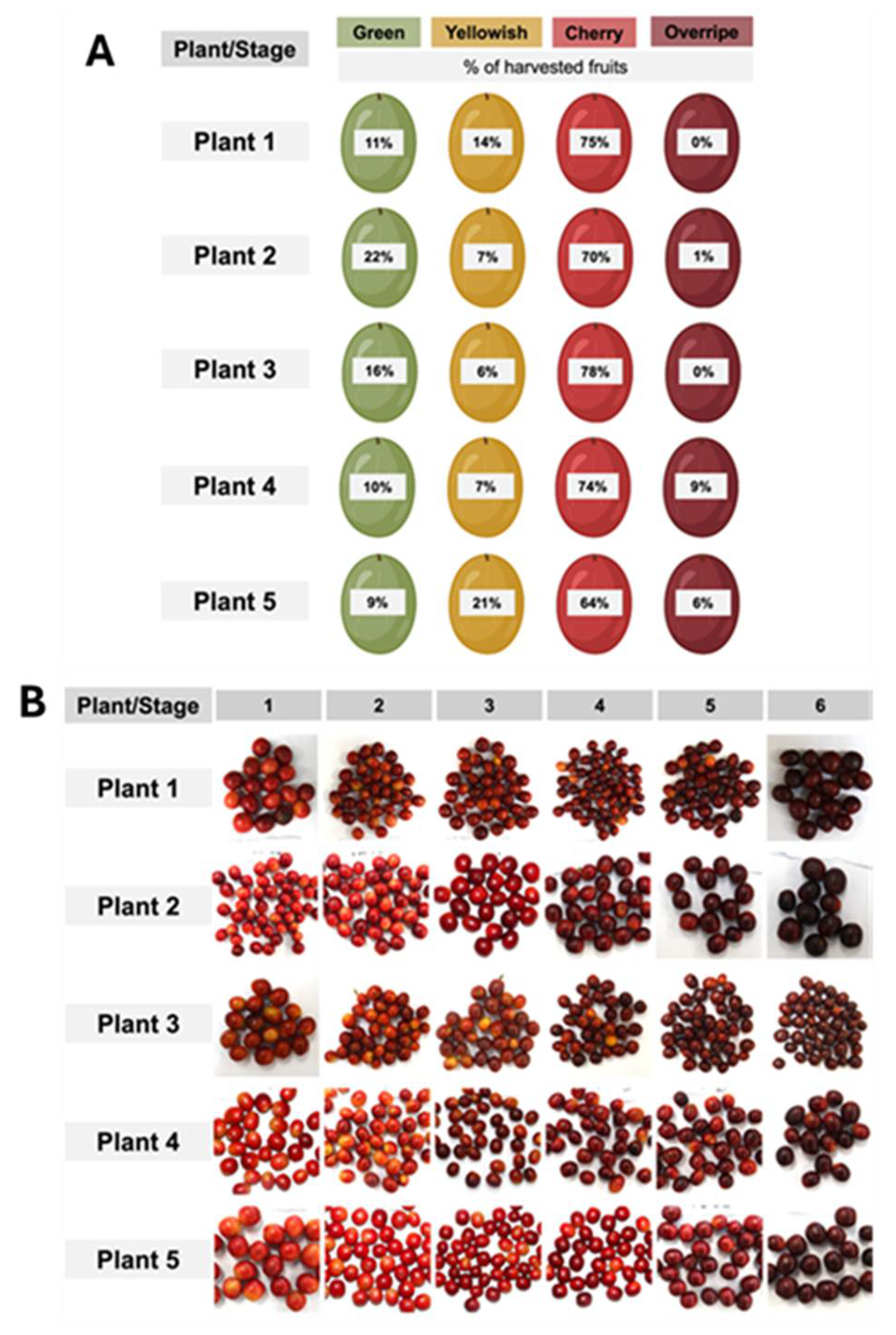
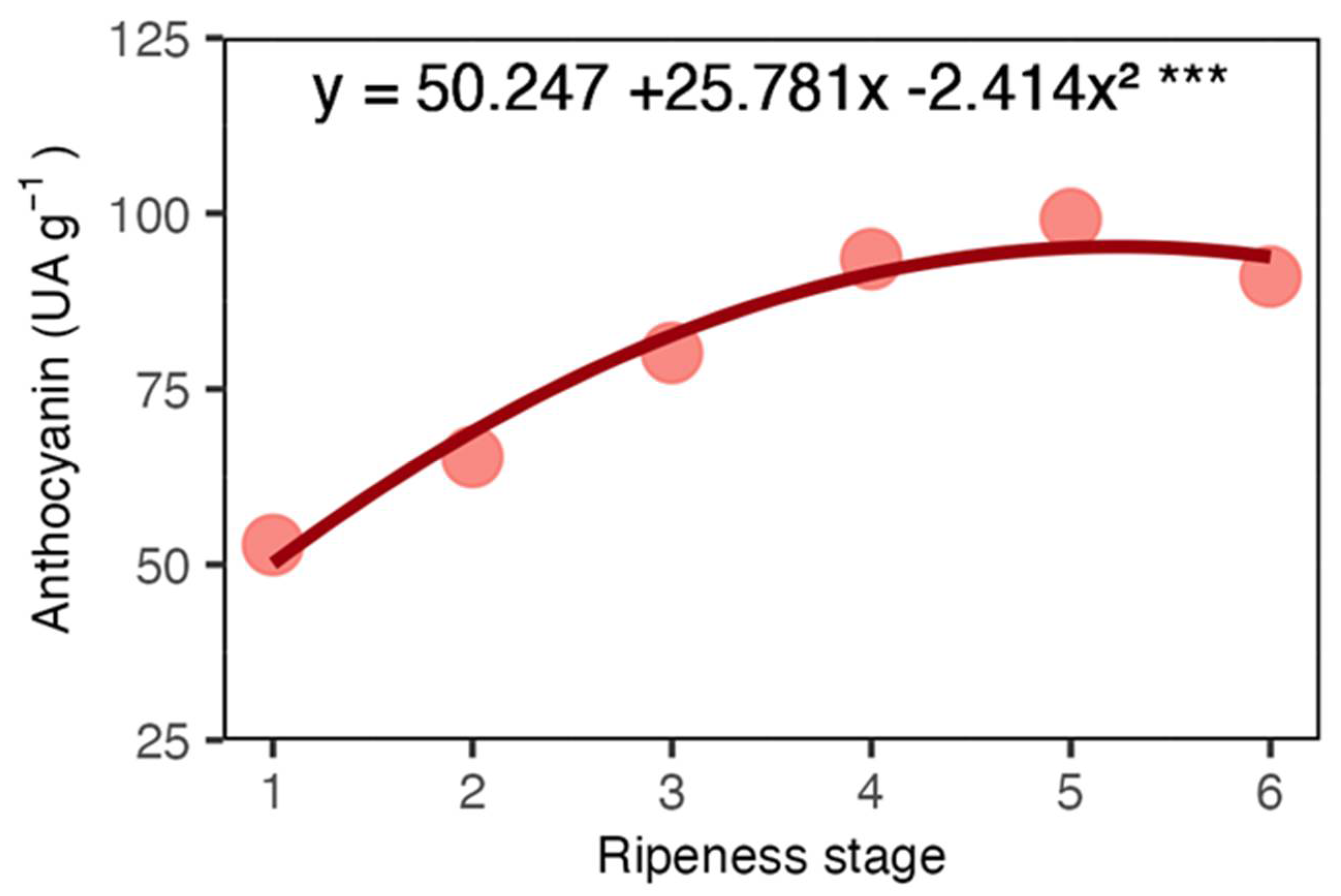
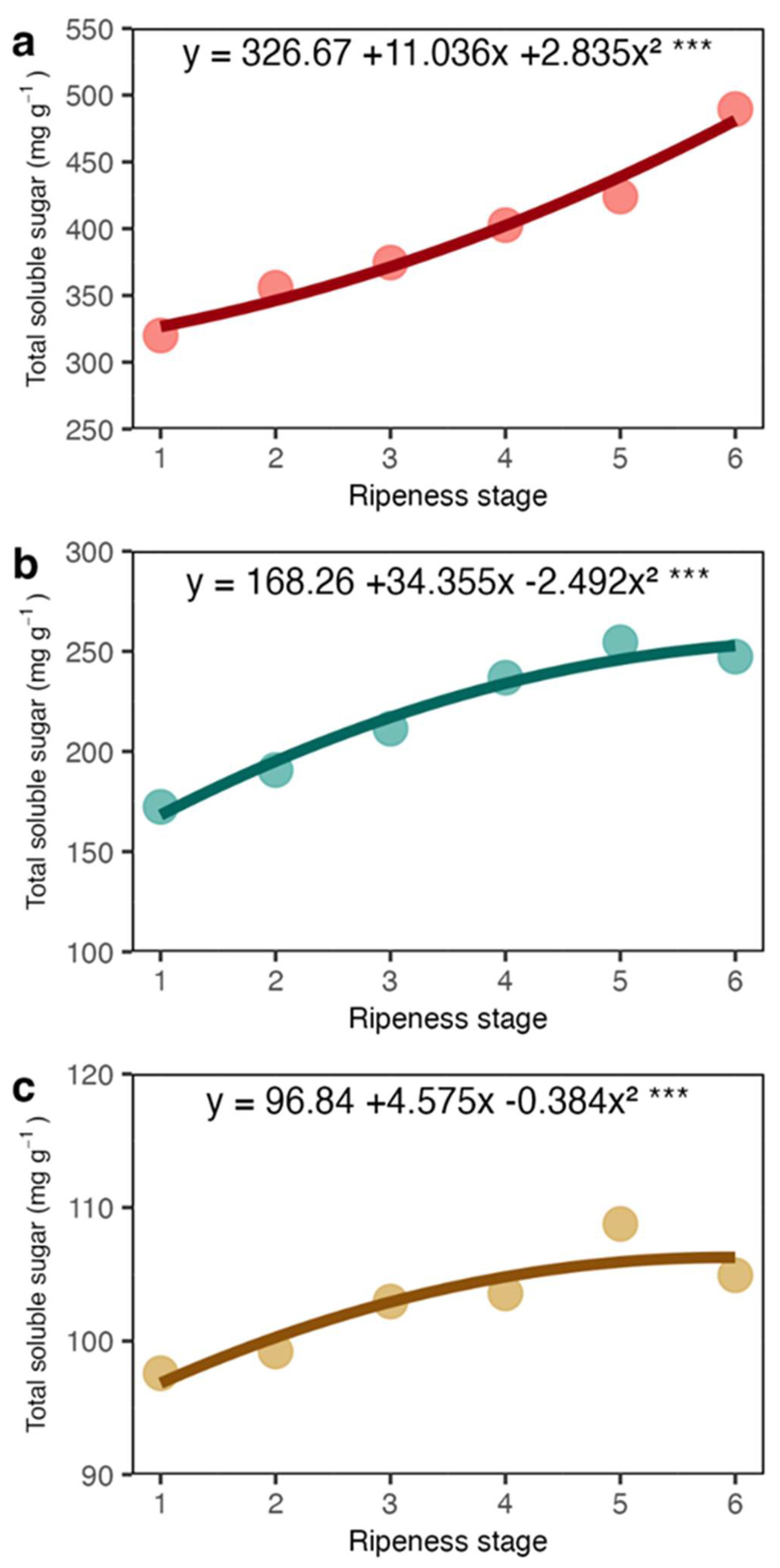
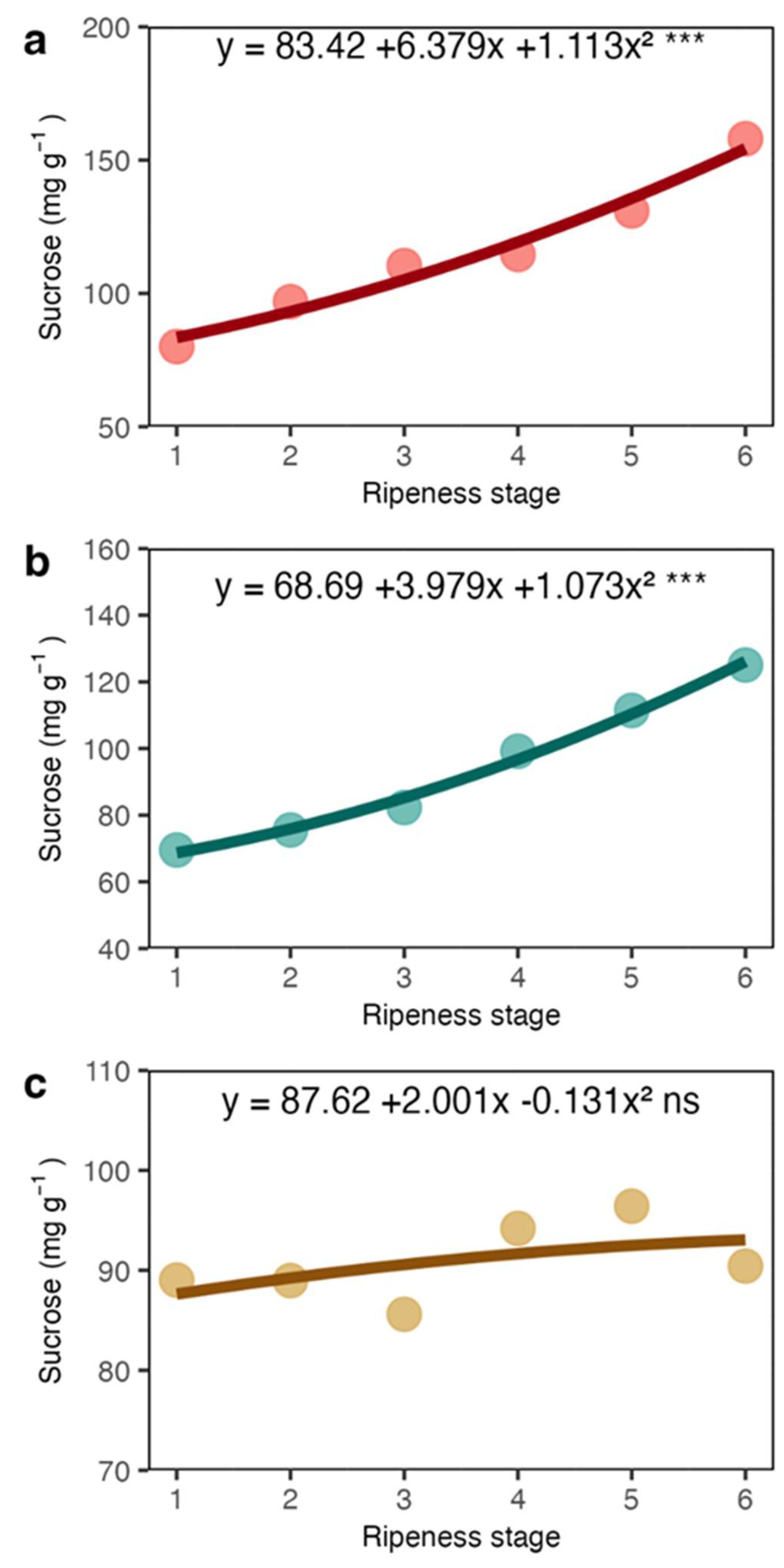
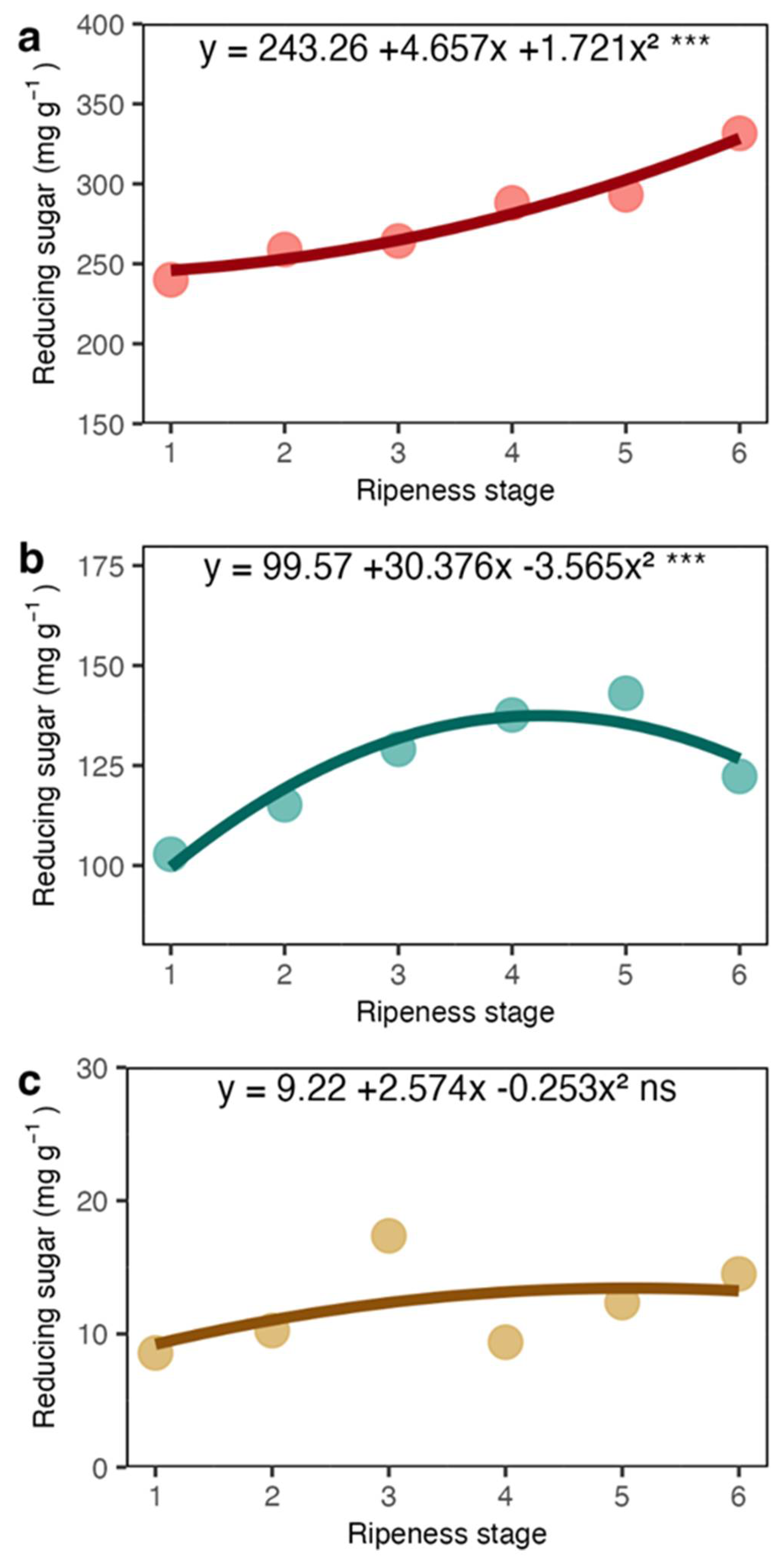
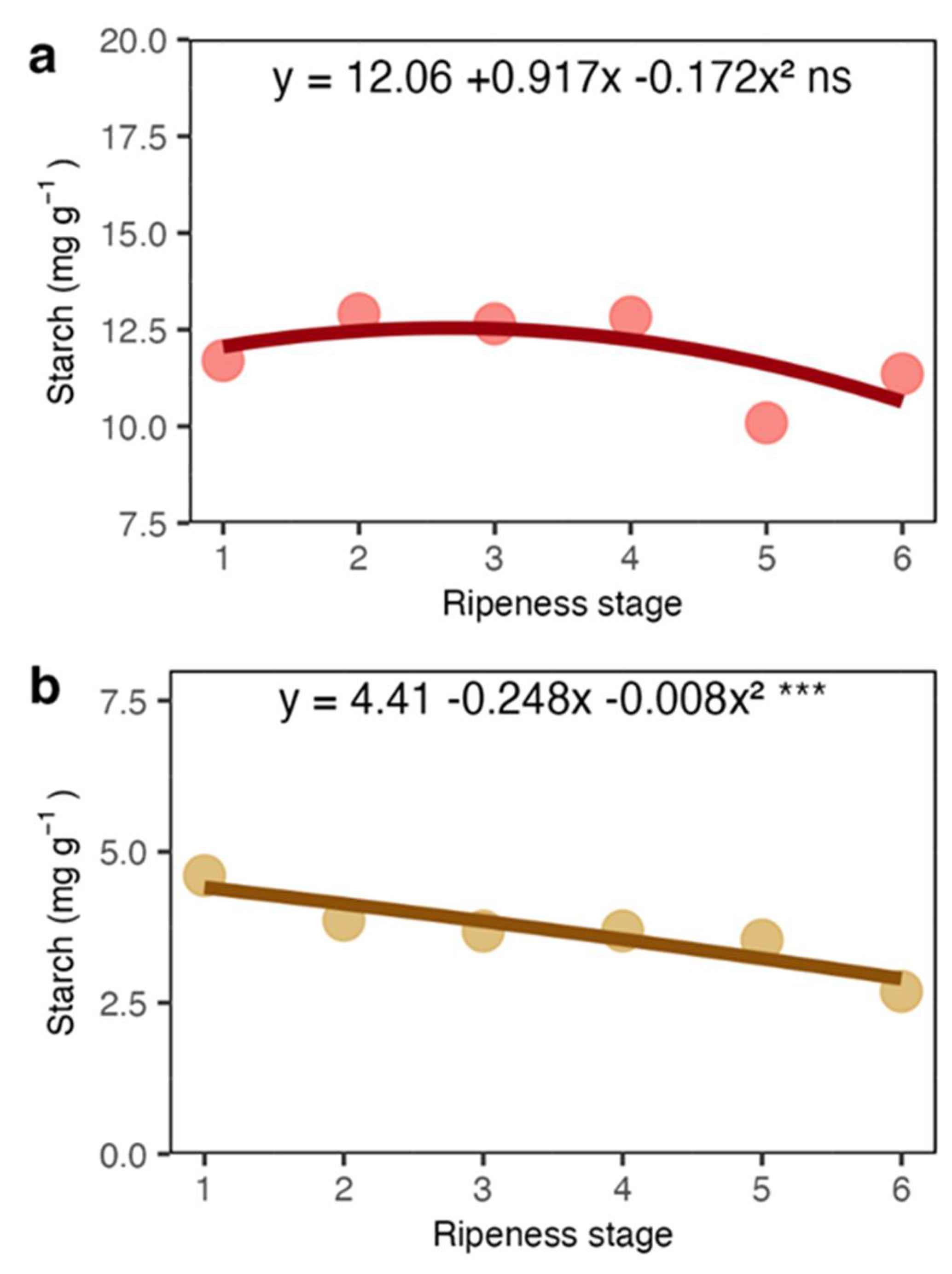
Disclaimer/Publisher’s Note: The statements, opinions and data contained in all publications are solely those of the individual author(s) and contributor(s) and not of MDPI and/or the editor(s). MDPI and/or the editor(s) disclaim responsibility for any injury to people or property resulting from any ideas, methods, instructions or products referred to in the content. |
© 2024 by the authors. Licensee MDPI, Basel, Switzerland. This article is an open access article distributed under the terms and conditions of the Creative Commons Attribution (CC BY) license (http://creativecommons.org/licenses/by/4.0/).




